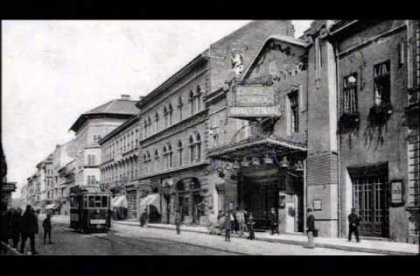Paul Abraham

Biography
Paul Abraham was born into a Jewish Hungarian family in Apatin, Austria-Hungary (today Serbia). His father Jakab was a merchant, later on the manager of a small private bank; his mother Flóra Blau hailed from Mohácz, southern Hungary. After attending the Realschule and school of economy in Apatin, from 1906 to 1909 he studied at a commercial college in Budapest, where, following his father’s death, his family moved. In 1913, he enrolled at the Royal Hungarian Academy of Music, where he studied the composition until 1917. After the war, he started speculating on the stock exchange, yet because of the hyperinflation in Central Europe lost his entire fortune, and probably even spent some time in prison.
When it comes to music, just like many other operetta composers, Abraham initially wrote “serious” works: sacred pieces, string quartets, and even a cello concerto. In 1927, after overcoming post-war difficulties, his life finally took a turn for the better. He was provided the opportunity to compose music for the silent film Die Frau aus dem Orient (The Woman from the East) and was appointed Kapellmeister at the Budapesti Operettszínház theatre, which on 13 October 1928 premiered his first operetta, Der Gatte des Fräuleins (The Young Lady’s Husband). Yet the true watershed in his career would come in 1930, when Abraham achieved a resounding success with his third operetta, Viktoria und ihr Husar (Victoria and Her Hussar), whose German premiere in Leipzig propelled the virtually unknown composer from the Budapest outskirts among the most feted in Germany. Its conventional title notwithstanding, the piece enthralled audiences with its exceptionally modern music, extending the orchestra with a complete jazz band. Abraham brought to Leipzig from Budapest the superb singers Oszkár Dénes, Gitta Alpár and Rózsi Bársony, who would soon become stars of 1930s operetta. Viktoria und ihr Husar would be staged across Europe, and Paul Abraham would be adored as a true celebrity. The three years that followed were the most glittering in his life.
Fame and fortune
Within a few months, Paul Abraham became a very wealthy man. He bought a sumptuous Rococo-style villa in Berlin, mingled with the city’s crème de la crème and threw lively parties. While living a wild life, revelling in alcohol and indulging in casual sex, Abraham frenetically composed operettas and film music, and conducted. His fourth operetta, Die Blume von Hawaii (The Flower of Hawaii, 1931), depicting the story of a US Navy captain who falls in love with a Hawaiian princess, was an enormous triumph, which would only be surpassed by his fifth operetta, Ball im Savoy. The latter’s opening performance in Berlin in 1932, with Gitta Alpár, Herbert Ernst Grohe, Oszkár Dénes and Rózsi Bársony cast in the lead roles, was the last great operetta event in the Weimar Republic. Its “glitzy premiere was such a tremendous success that the Grosses Schauspielhaus is set for a long time to come,” wrote one of the Berlin critics, without anticipating how prophetic his words would be. Ball im Savoy enraptured Berlin music lovers, with the score containing several smash hits, the most notable songs being Toujours l’amour (Love Everlasting), Kangaroo and Wenn wir Türken küssen (When We Turks Kiss). At the time, however, the ominous clouds of Nazism had begun gathering above Abraham…
Abraham’s “hit-crammed dramaturgy” was typical of late 1930s operetta, blending as it did emotion and erotica, jazz, revue and classic operetta. The composer also brought to bear his talent in the fledgling sound film. He wrote scores for numerous movies, the first being the 1929 Melodie des Herzens (Melody of the Heart), and the most acclaimed the 1931 Die Privatsekretärin (The Private Secretary), starring Renate Müller in the lead role. In the 1930s, Abraham’s most popular operettas, Viktoria und ihr Husar (1931), Die Blume von Hawaii (1933) and Ball im Savoy (1935), were cinematised, with the films featuring actors/singers he himself had discovered, including the fabulous Marta Eggerth, who would later on also become a Hollywood star.
Why do I have to go?
Barely a month after the premiere of Ball im Savoy, Adolf Hitler became Chancellor of Germany, which would seal the fate of Paul Abraham, as well as of the Jewish artists with whom he closely collaborated. The production was withdrawn from the repertoire, with the last performance held on 2 April 1933. Abraham fled Germany in haste. He left about 300 song manuscripts at his villa, which his butler would sell to inferior non-Jewish composers, who went on to publish them under their own names, and earn fame and a lot of money as hit-makers. The film director Geza von Cziffra, who also lived and worked in Prague, later on recalled a conversation with Abraham before he left Berlin. “I wanted to die in this city!” Abraham exclaimed. “You still can, Paul. After this horrid episode ends, you can come back”, Czifra responded. “But why do I have to go? Just because I’m circumcised?” the composer lamented.
Rock bottom
Following his escape to Budapest, Abraham plunged into creating operettas for theatres in Hungary and Vienna, in tandem with the librettist Alfred Grünwald. (Grünwald and Fritz Löhner-Beda penned texts for the three most popular Abraham operettas.) Nevertheless, none of them gained acclaim equal to that of his previous pieces, with the last one being Roxy und ihr Wunderteam (Roxy and Her Wonder Team, 1937). What’s more, in 1938 the political crisis took a dramatic turn for the worse. In February 1939, Abraham left Hungary. For a year he lived in Paris, from where he moved to Havana, before emigrating to New York. Yet America did not take to his music. It would seem that Abraham arrived too late. In a letter dated 1943, Alfred Grünwald, his fellow traveller, summed up the situation as follows: “I am really deeply sorry […] that we were so stupid as not to leave for New York ten years earlier. We would have been the greatest in theatre and film! Today it is a hundred times more difficult to gain recognition …”
Unfortunately, Abraham did not hold the rights to his greatest pre-war operetta hits. While his material distress grew worse, he began showing the first symptoms of a mental illness. In 1946, he was committed to a hospital in Manhattan after in the middle of the traffic in Madison Avenue he conducted an imaginary orchestra: in white gloves, like at the time of his greatest glory. Diagnosed with psychosis as a result of syphilitic meningitis, he was soon transferred to the Creedmoor Psychiatric Center in Queens, where he would stay for an incredible ten years, sharing a room with another 14 patients, working in the kitchen, sweeping floors …
After WWII, upon the initiative of the film producer Alexander Paal, the Society of Paul Abraham’s Friends was established in Hamburg with the aim to get the crushed artist from the USA back to Germany, which they succeeded in doing in 1956. Following his arrival, Abraham spent six months at the psychiatric clinic of the University Medical Centre Hamburg-Eppendorf. His metal condition stabilised, yet until his death he believed he was in New York, and kept writing letters to his friends about the sensational American premieres of his works. Paul Abraham died on 6 May 1960, during surgical removal of a malign tumour from his knee.
Paul Abraham was the king of European operetta for a mere three years, but within that short time he breathed new life into the genre. His illustrious career was mercilessly cut short by unfortunate circumstances he himself could not influence. Yet his fantastic songs have survived despite his genius having been silenced too soon. Today we can thus fully savour them like our music-loving ancestors did in the 1930s.

















